srI:
srImathE rAmAnujAya nama:
srImadh varavaramunayE nama:
srI vAnAchala mahAmunayE nama:
Note: srI U. vE.
gOpAlakrishNa dhAsar (kOnAr) who was living in chennai and a sishya of
kOil kandhAdai vAdhUla aNNan swamy compiled a set of beautiful
phrases/sentences from nampiLLai‘s eedu (documented by vadakku thiruvIdhi piLLai) vyAkyAnam long ago. kOil vidhwAn srI U. vE. R
narasimhAchAryar swamy (paramapadhavAsi) wrote simple thamizh meanings
for those phrases/sentences. This book (https://docs.google.com/file/d/0ByVemcKfGLucbWJNTUMzVS1KTzA/edit?usp=sharing) was originally released on 7-1-68 and
was re-published by puthur raghurAman swamy (editior: srI sailEsa
dhayApAthram magazine). In this series we are relishing this great compilation with the english translation for the same.
gOpAlakrishNa dhAsar (kOnAr) who was living in chennai and a sishya of
kOil kandhAdai vAdhUla aNNan swamy compiled a set of beautiful
phrases/sentences from nampiLLai‘s eedu (documented by vadakku thiruvIdhi piLLai) vyAkyAnam long ago. kOil vidhwAn srI U. vE. R
narasimhAchAryar swamy (paramapadhavAsi) wrote simple thamizh meanings
for those phrases/sentences. This book (https://docs.google.com/file/d/0ByVemcKfGLucbWJNTUMzVS1KTzA/edit?usp=sharing) was originally released on 7-1-68 and
was re-published by puthur raghurAman swamy (editior: srI sailEsa
dhayApAthram magazine). In this series we are relishing this great compilation with the english translation for the same.
Please view the previous article at https://granthams.koyil.org/2013/07/divine-revelations-of-lokacharya-1/
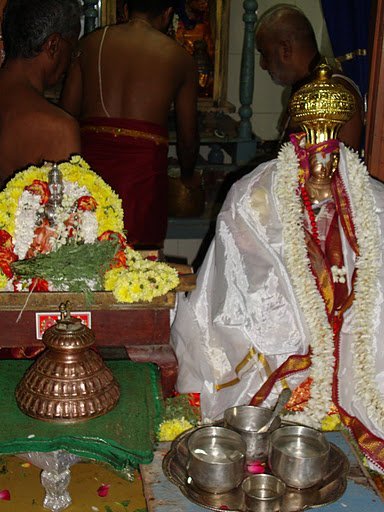
nampiLLai – thiruvallikkENi
11. prApyAbhAsangaLilu prApagAbhAsangaLilum negizhnthu avanaiyozhintha ellAvARRAlum oru prayOanaminRikkE irukka vENum.
ப்ராப்யாபாஸங்களிலு ப்ராபகாபாஸங்களிலும் நெகிழ்ந்து அவனையொழிந்த எல்லாவாற்றாலும் ஒரு ப்ரயோநமின்றிக்கே இருக்க வேணும்.
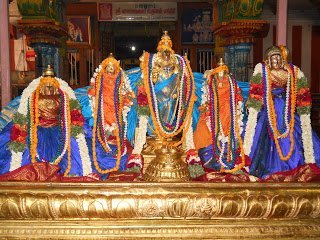
dheivanAyakan and his divine consorts – nammAzhwAr declares total surrender towards him
Any other goal than bhagavAn is simply not truly achievable goal. Any other means than bhagavAn is simply not a true path. One should clearly remove these misconceptions from the mind and be fully faithful that there is nothing other than bhagavAn to be achieved. That is the best situation to be for a jIvAthmA.
12. paramasEshiyaik kaNdAr dhvArasEshigaL aLavil nillArgaLiRE.
பரமசேஷியைக் கண்டார் த்வாரசேஷிகள் அளவில் நில்லார்களிறே.
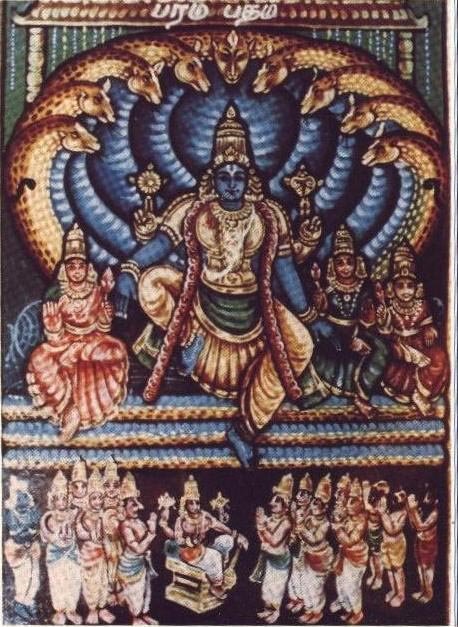
paramapadhanAthan – master of nithya sUris and everyone else
emperumAn who does not have any one equal or higher to him is the true master for every one. Other dhEvathas such brahmA, rudhran, etc., are called dhvAra sEshis – meaning they are empowered by antharyAmi emperumAn (srIman nArAyaNan) to be master of certain tasks (like creation, annihilation, etc). bhagavAn blesses the ones who surrender unto him directly. For the ones who surrender to other dhEvathas, he blesses them indirectly through the dhEvathas (by being the antharyAmi of those dhEvathas). Thus, the ones who have truly understand the nature of bhagavAn, will not approach other dhEvathas such as brahmA, rudhran, etc.
13. avan thAnE kAtta AzhwArgaL kaNdAppOlE kANbArkkuk kANalAmiththanai allathu svayathnaththAl kANbArkku aRiyappOmO.
அவன் தானே காட்ட ஆழ்வார்கள் கண்டாப்போலே காண்பார்க்குக் காணலாமித்தனை அல்லது ஸ்வயத்னத்தால் காண்பார்க்கு அறியப்போமோ.
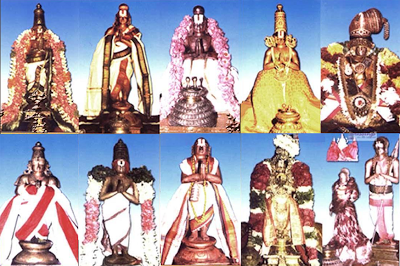
emperumAn revealed his true nature, forms, auspicious qualities, wealth (nithya/leelA vibhUthis), etc to AzhwArs out of his nirhEthuka krupai (causeless mercy) and thus they saw him. Unless emperumAn reveals these mercifully by himself, it is impossible difficult to understand him through ones own efforts.
14. AsrayaNIyan avanE! brahmarudhrAdhigaL AsrayaNIyar allar.
ஆச்ரயணீயன் அவனே! ப்ரஹ்மருத்ராதிகள் ஆச்ரயணீயர் அல்லர்.
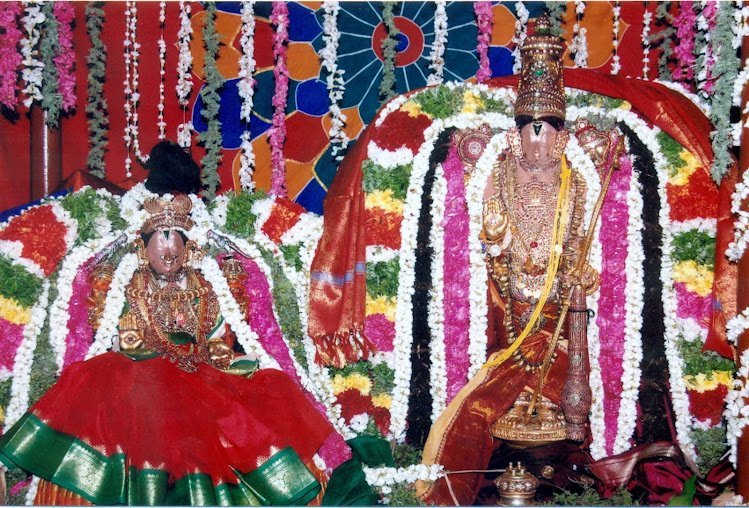
nammAzhwAr demonstrates ananya gathithvam (no other refuge) towards ArAvamuthan
15. muktharum nithyarum thAngaLum anubaviththu avanaiyum AnandhippippargaL. bhadhdhar thAngaL AnandhiyAdhE avanai AnandhippippargaL.
முக்தரும் நித்யரும் தாங்களும் அநுபவித்து அவனையும் ஆநந்திப்பிப்பர்கள். பத்தர் தாங்கள் ஆநந்தியாதே அவனை ஆநந்திப்பிப்பர்கள்.
mukthas (liberated jIvAthmAs) and nithyas (eternally free jIvAthmAs) enjoy themselves and bring great joy to srIman nArAyaNan. bhadhdhas (conditioned jIvAthmAs in samsAram) suffer (due to ignorance in bhagavath vishayam) and bring joy to srIman nArAyaNan by becoming part of his leelai.
16. sarvEsvaran thrividha chEthanaraiyum svarUpAnurUpamAga adimai koLLA ninRAn.
ஸர்வேச்வரன் த்ரிவித சேதநரையும் ஸ்வரூபாநுரூபமாக அடிமை கொள்ளா நின்றான்.
The supreme lord accepts service from all 3 types of chEthanas/jIvAthmAs according to their nature. mukthas – liberated, nithyas – eternally free, bhadhdhas – conditioned souls.
17. virOdhiyaip pOkki ujjIvippikkaiyiRE avathArangaLukku prayOjanam.
விரோதியைப் போக்கி உஜ்ஜீவிப்பிக்கையிறே அவதாரங்களுக்கு ப்ரயோஜநம்.
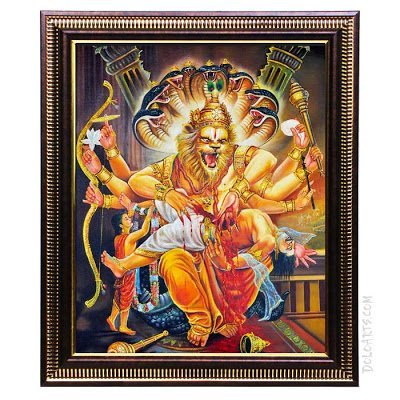
bhagavAn‘s narasimha avathAram to annihilate hiraNyakasipu and protect prahlAdhAzhwAn
The purpose/objective of bhagavAn’s incarnations is to destroy the evil forces who are opposed to his devotees and to uplift his devotees.
Translator’s note: The same principle is identified by piLLai lOkAchAryar in srIvachana bhUshaNa dhivya sAsthram – bhagavAn’s avathArams and his great activities during such avathArams are due to the offenses that were done against bhAgavathas.
18. karma samsrushtarAna chEthanarkku karma sambandhamaRRu anubavikkaikku mun thirumEniyilE nenjai vaikkap pOgAthirE.
கர்ம ஸம்ஸ்ருஷ்டரான சேதனர்க்கு கர்ம ஸம்பந்தமற்று அநுபவிக்கைக்கு முன் திருமேனியிலே நெஞ்சை வைக்கப் போகாதிரே.
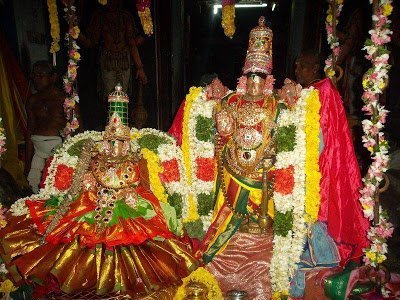
nammAzhwAr (who was fully removed of any effects of karmA by the divine grace of emperumAn) shows great attachment towards the beauty of makara nedunkuzhaik kAthar, thenthiruppErai
samsAris (conditioned souls) are bound by their karmA. bhagavAn’s divine forms are most beautiful and have the ability to remove all sorrows of the ones who see them. But until ones karmA is nullified, one will not be able to fully engage ones mind into the divine forms of bhagavAn.
19. sEshavasthuvukku sEshathvam nirupakamAnAl nirUpakaththaiyozhiya nirUpya sidhdhi illai.
சேஷவஸ்துவுக்கு சேஷத்வம் நிருபகமானால் நிரூபகத்தையொழிய நிரூப்ய ஸித்தி இல்லை.
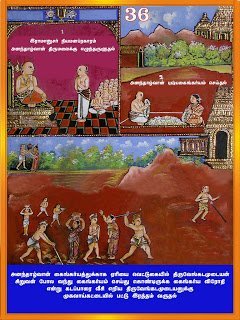
ananthAzhwAn manifested the true spirit of kainkaryam by serving in thirumalai per emperumAnAr‘s orders
nirUpakam – that which is used to establish the quality; nirUpyam – that which is established;
The jIvAthmA’s natural subservience to emperumAn is determined by his actions of service towards emperumAn, His nature is determined through his service. So, the ones who dont serve emperumAn does not qualify to be a chEthanan/jIvAthmA (soul) – i.e., he will be considered as achit (insentient – without knowledge) only.
20. pArathanthriya rasam aRivArkku svAthanthriyam anarththam.
பாரதந்த்ரிய ரஸம் அறிவார்க்கு ஸ்வாதந்த்ரியம் அநர்த்தம்.
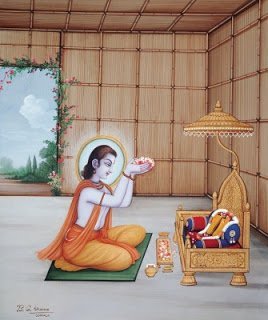
bharathAzhwAn manifested absolute dependence towards srI rAma
pArathanthriyam – to be at the complete disposal of bhagavAn. For the ones who have tasted and understood being dependent on bhagavAn and being fully at his disposal, the thought that “I am independent” is very fearful.
Full series can be viewed at: https://granthams.koyil.org/divine-revelations-of-lokacharya-english/.
adiyen sarathy ramanuja dasan
archived in https://granthams.koyil.org, also visit https://acharyas.koyil.org, https://sriperumbuthur.blogspot.com